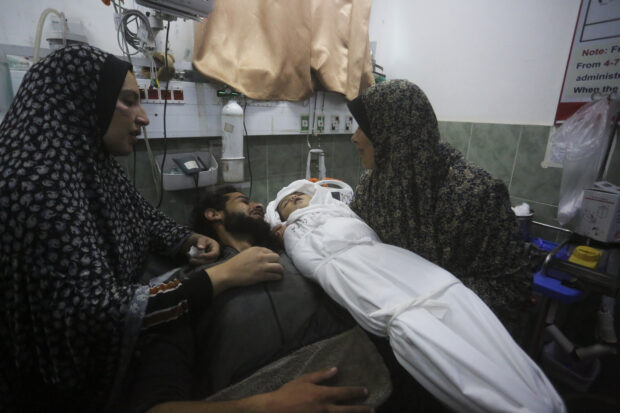Infant Palestinian girl, 2-year-old brother killed in Israeli strike

A Palestinian woman shows the body of her grandchild to the infant’s father after the baby girl was killed in the Israeli bombardment of the Gaza Strip outside a morgue in Rafah, Tuesday, Dec. 19, 2023. (AP)
RAFAH, Gaza — She was born amid war in a hospital with no electricity in a southern Gaza city that has been bombarded daily. Her family named her al-Amira Aisha — “Princess Aisha.” She didn’t complete her third week before she died, killed in an Israeli airstrike that crushed her family home Tuesday.
Her extended family was asleep when the strike leveled their apartment building in Rafah before dawn, said Suzan Zoarab, the infant’s grandmother and survivor of the blast. Hospital officials said 27 people were killed, among them Amira and her 2-year-old brother, Ahmed.
“Just 2 weeks old. Her name hadn’t even been registered,” Suzan said, her voice quivering as she spoke from the side of her son’s hospital bed, who was also injured in the blast.
The family tragedy comes as the Palestinian death toll in Gaza nears 20,000, according to the Health Ministry. The vast majority have been killed in Israeli airstrikes, which have relentlessly pounded the besieged Gaza enclave for two and a half months, often destroying homes with families inside.
The war was triggered when militants from Hamas, which rules Gaza, and other groups broke into southern Israel on Oct. 7, killing some 1,200 people, mostly Israeli civilians, and abducting 240 others.
Article continues after this advertisementThe Zoarab family were among the few Palestinians in Gaza who remained in their own homes. Israel’s onslaught, one of the most destructive of the 21st century, has displaced some 1.9 million people — more than 80% of the territory’s population — sending them in search of shelter in U.N. schools, hospitals, tent camps, or on the street.
Article continues after this advertisementBut the Zoarabs stayed in their three-story apartment building. Two of Suzan’s sons had apartments on higher floors, but the extended family had been crowding together on the ground floor, believing it would be safer. When the strike hit, it killed at least 13 members of the Zoarab family, including a journalist, Adel, as well as displaced people sheltering nearby.
“We found the whole house had collapsed over us,” Suzan said. Rescue workers pulled them and other victims, living and dead, from the wreckage.
Israel says it is striking Hamas targets across Gaza and blames the militants for civilian deaths because they operate in residential areas. But it rarely explains its targeting behind specific strikes.
Princess Aisha was only 17 days old. She was born on Dec. 2 at the Emirati Red Crescent Hospital in Rafah while there was no power at the facility, Suzan said — less than 48 hours after the bombardment of the town and the rest of Gaza resumed following the collapse of a week-long cease-fire between Israel and Hamas.
“She was born in a very difficult situation,” Suzan said.
As of Monday, 28 of Gaza’s 36 hospitals across the Gaza Strip were reported as out of service, the U.N. said, while eight remaining health facilities were only partially operational. Amid the devastation, some 50,000 Palestinian women are pregnant, the WHO said.
Princess Aisha and Ahmed’s parents survived — their mother, Malak, with burns and bruises on her face, and their father, Mahmoud, with a fractured pelvis. As Mahmoud lay in his bed at Rafah’s Kuwaiti Hospital, Suzan brought him the two children for a final goodbye before they were buried.
Mahmoud grimaced with pain as he pulled himself up to cradle Ahmed, wrapped in a white burial shroud, before falling back and weeping. His wife held Princess Aisha, also bundled in white cloth, up to him.
Dozens of mourners held a funeral prayer Tuesday morning outside the hospital in Rafah, before taking Princess Aisha, Ahmed and the others killed in the strike for burial in a nearby cemetery
“I couldn’t protect my grandchildren” Suzan said. “I lost them in the blink of an eye.”